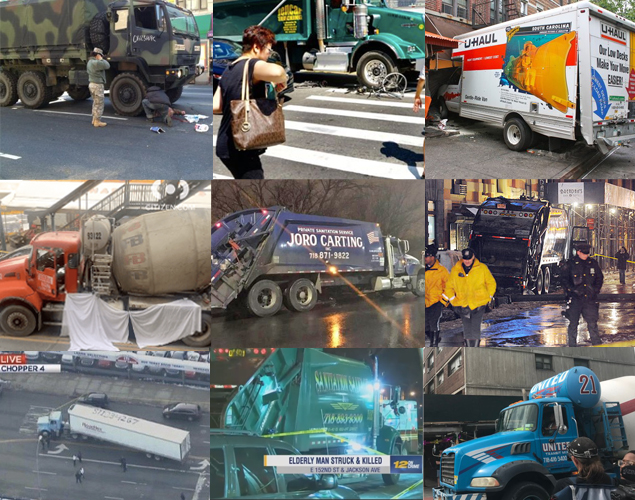Keep on truckin'!
The NYPD admitted on Wednesday that cops wrote more moving violations tickets to cyclists than truckers last year — a stunning revelation not only because of how few bicycles are on the roads compared to trucks, but also astounding given the disparate killing power of the very different vehicles.
First, the revelation: At a City Council hearing on Wednesday, NYPD Transportation Bureau Chief William Morris told lawmakers that the NYPD wrote 34,593 moving violation tickets to truck drivers last year and "north of 35,000" moving violation tickets to cyclists.
Next, the context: Trucks, Morris said, represent 10 percent of all traffic on city streets. Truck drivers were responsible for 43 of the 220 road deaths last year, a tally that includes 28 cyclists and 122 pedestrians. Truck drivers also caused tens of thousands of injuries. Cyclists represent about 1 percent of all traffic, according to the city. Cyclists were blamed for two deaths last year and several hundred injuries.
According to @NYPDTransport at today's @NYCCouncil Transportation Committee hearing, cyclists were issued more moving violations than truck drivers in 2019 -- 35,000 vs 34,600.
— Transportation Alternatives *Vote on Sammy's Law* (@TransAlt) January 29, 2020
Next, the analysis: The numbers speak for themselves: Mayor de Blasio's NYPD targets city cyclists with a disproportionate enforcement effort. And Morris's comments only back up what we already know: Last year, Morris's predecessor Thomas Chan used a similar City Council hearing to reveal that cyclists — again, who represent 1 percent of the trips — received 22 percent of all red light tickets written by cops even though car drivers who run a red light clearly endanger the public far more than a cyclist who does the same.
Finally, the outrage:
“It’s outrageous that the city sees an equivalence between trucks and bike riders in making priorities for traffic enforcement,” said Jon Orcutt, advocacy director of Bike NY and a former official with the Bloomberg-era DOT.
Transportation Alternatives' spokesman Joe Cutrufo focused on the disproportionate killing power of trucks.
"I can't believe anyone should have to explain this, but it's pretty clear that trucks are capable of creating a lot more danger on our streets than people riding bicycles," he said. "The NYPD needs to take a more data-driven approach. And the numbers show that 20-ton trucks are much, much more deadly than 40-pound bikes.
“I can’t help but wonder what’s at work here," Cutrufo added. "We know that cycling crackdowns are a thing — often in the immediate aftermath of, ironically, crashes in which truck drivers kill cyclists and leave the scene. Is it just that it’s easier to step out in front of a person riding a bike than it is to pull a truck driver over?”
Pulling back from the specific numbers, experts saw just another example of the NYPD's misallocation of its limited crime-fighting resources.
"It's a disgrace," said Steve Vaccaro, a lawyer who represents cyclists in crash cases. "It is, boiled down in one factoid, proof of the NYPD's abject failure to grasp that the danger caused by the charged misconduct must factor into officer discretion in traffic enforcement." (That's legalese for, "Catch the big fish, not the small fry.")
Morris wasn't pressed for more information by lawmakers, so we reached out to the NYPD to explain what is going on. The agency has not gotten back to us. We also reached out to City Hall, which did not immediately comment (though we didn't give them much time!).
When he gets angry, Streetsblog Editor Gersh Kuntzman writes the Cycle of Rage column, which are archived here.






